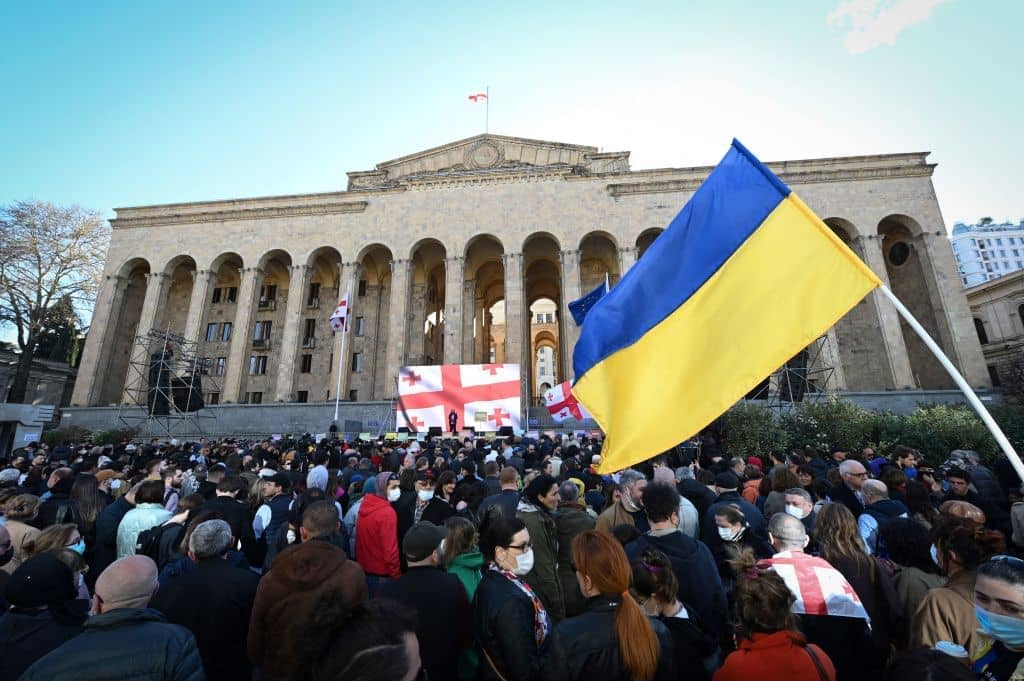Georgia seems to have gone Ukraine crazy since the outbreak of war in February. Taxi drivers have the Ukrainian flag on their dashboards. Takeaway coffees come in blue and yellow paper cups with ‘Glory to Ukraine’ written on them. Medicines come in blue and yellow bags. There are Ukrainian-coloured scooters for hire in Tbilisi and written on the huge city metro telescreens are the words ‘Be Brave like Ukraine’. There is so much glory for Ukraine in Georgia you wonder whether the Georgians have any left for themselves. They might well argue, however, that the two things are inseparable. In a recent interview, the Georgian president Salome Zourabichvili described Ukraine as ‘another self that is now under attack, adding ‘We have already had this experience.’
And to a lesser extent, they have. In 2008, the Russians invaded Georgia, occupying two of its separatist territories, Abkhazia and Samachablo (South Ossetia), leaving over 400 Georgians dead and many more injured. For at least a month Georgia was the world’s post-Soviet martyr country of choice, with sympathisers worldwide trying to track it down on a map (‘No, not the American state, stupid!’) and newspapers in Estonia publishing Georgian recipes like Kharcho soup and Chicken Satsivi. At least 10,000 Russian troops are still stationed there and there are frequent border incursions. Ukraine’s current situation may well become Georgia’s next, and if Putin achieves his aim of dominating the Ukraine Black Sea coast it will clearly be catastrophic for Georgia economically and militarily.
As soon as the invasion took place in February, the yellow-and-blue started to appear on Instagram and Facebook pages – like ‘a volcano’, one Georgian said to me. By the evening of 24 February, the outbreak of war, as many as 30,000 Georgians waving Ukrainian flags were out on the streets in solidarity, with demonstrations in cities like Kutaisi, Batumi and Poti. YouTube posts show masses of people carrying banners, with slogans like ‘Today we are all Ukrainians’ and ‘Ukrainians, we’re proud of you.’
However, another reads: ‘Georgian government, F off to Russia’, and here is where things get complicated. The Georgian people may have fervently supported Ukraine, but their government has not. On February 25, the day after Putin’s invasion, Prime Minister Irakli Garibashvili said he wanted to ‘state clearly and unambiguously’ that Georgia did not plan to take part in economic sanctions against its vast northern neighbour, ‘as this would only damage our country and populace more.’
Moves were also made by Garibashvili to stop Georgian nationals volunteering to fight in Ukraine, which led to Zelensky, in some disgust, recalling the Ukrainian ambassador to the country. It was also a position that failed: though there are no precise estimates of how many Georgians are currently fighting in Ukraine at least nine Georgians have died and had heroic funerals back in their country.
A split then opened up between president and prime minister. Zourabichvili attended the funerals, Garibashvili did not. And although Zourabichvili has tried to make her pro-Ukrainian statements as cautious as possible, she has still been warned by her government to leave the fray, with the ruling Georgian Dream party taking steps to sue her in civil court for making unauthorised visits to Paris and Brussels to discuss the Russian invasion. It is a rum situation indeed, though it’s clear the president is close to the people on this. In the past week Garibashvili has been forced to row back, making placatory speeches about the government’s ‘full solidarity’ with Ukraine and ‘strong support’ for the country’s sovereignty and territorial integrity.
I meet David, an historian from Georgia in a café in his home city of Kutaisi to discuss the conflict. The beer garden wall is covered with the Ukrainian colours and has become an informal graffiti-board for locals and tourists. ‘The Hague is waiting, Putin, said one daub. Another, written by Ukrainians in Cyrillic, said ‘Russian tourists, while you are relaxing here, your soldiers are killing our children. Please stop.’ My personal favourite, for its brevity, was just two words: ‘Puck Futin.’
David is clear about Georgia’s vulnerable relationship with Russia: ‘We’ve had this situation… for centuries. We still couldn’t believe it when Russia invaded Ukraine like this. This is like something from the 11th Century.’ What does Georgia need to defend itself? ‘We need EU membership, we need Nato membership. We need to get eco-independence from Russia. But all this takes money. If we want better institutions, we need to sort out our economy as well.’
He was clear that the Ukrainians’ fight was Georgia’s too. ‘If you want to be free, if you want to be a stronger country, and if you want to be a member of those civilised countries which respect each other, you must know that Ukraine is the country where this battle is being fought.’
And would he himself fight, I asked, if Russia invaded? David didn’t look like a soldier. ‘Absolutely,’ he said. ‘I don’t want to be a slave. So I will fight for my country, my city, my family, my generation, my future.’
We were joined by Gizo, the restaurant’s owner, who painted that blue and yellow wall. ‘Whatever happens, the Ukrainians have won this war already,’ he said. ‘They have finally shown the world Russia’s true face.’
Both were fanatically pro-Boris, in ways that might raise eyebrows back home. ‘He’s amazing,’ said Gizo. ‘For me, he’s amazing. Because he’s not afraid… I see him taking action, not just offering words.’ I thought cynically of that meme doing the rounds, of Boris and Zelensky sharing one speech bubble: ‘Thank you for rescuing me’ both are saying.
Was there anything else they wanted to add? I asked David and Gizo. ‘Absolutely,’ said David expansively. ‘Glory to Georgia. Glory to Ukraine. Glory to the Heroes. And Glory to that group of countries which respect each other and the law.’
As for old Futin, for Georgians he can just go Puck himself.






Comments